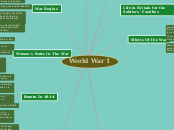World War 1
Irish Casualties at the Battle of the Somme
The 36th Ulster Division suffered more than 5500 casualties in the early days of the Battle of the Somme.
In Belfast, the Orange Order celebrations for the 12th of July, 1916 were cancelled.
At noon, all traffic stopped in Belfast and a five-minute silence was held in memory of the dead.
The extent of the loss made the Battle of the Somme a key event in Irish History
Europe In 1900
In 20th century emperors and kings
of Britain, France, Russia, Italy, Germany and Austria-Hungary ruled most of Europe.
Germany, Italy and Austria-Hungary formed an alliance known as Central Powers.
Britain, France, Russia formed an alliance known as Triple Entente
If countries in an alliance were attacked, other members agreed to come to its aid.
Germany was building an army and a navy and threatening the stability of Europe.
Life in Britain for the Soldiers' Families
Food was scarce in Britain during the war.
Hardship drove some people to alcohol problems.
British Prime Minister Lloyd George said, "Drinking is doing more damage than all the German submarines put together."
Effects Of The War
Countries involved in the war had expected it to last only a short time but it lasted for four years.
10 million people were killed and 20 million were missing.
New weapons were used int he war such as poisonous gas, flamethrowers and tanks and aeroplanes dropped bombs.
German U-Boats
Britain and France depended on America and Canada for arms and food.
The Germans hoped to starve Britain and France by using submarines called U-Boats to torpedo their supply ships.
Germany began to attack all ships in around Britain from February 1914.
More than 1000 people were killed, 128 of them were Americans.
In April 1917, America declared war on Germany.
End of The War
Russia withdrew from the war in 1917, because a revolution was taking place at home.
This meant that Germany could send all of its troops to the Western Front.
The welcome of American troops in France meant that extra attacks could be launched against the Germans.
The Germans realised they were losing the war and agreed to an armistice.
On November 11th, 1918. the guns fell silent on the Western Front.
In Brritian, France and America, people celebrated in the streets.
A peace conference was held in France in 1919.
Harsh terms were imposed on Germany.It had to disband its army and hand over certain territories to its neighbours.It also had to pay huge sums of money called reparations, in compensation for the war.
The winners and losers of the war looked to US President Woodrow Wilson to draw up a fair settlement.
The aim was to weaken Germany, so that it could never wage war again.
The long-term effect on Germany were the collapse of its enconomy and widespreads unemployment.These problems led to support for Adolf Hitler and, eventually to World War II.
The Battle of Somme
The Battle of Somme began on July 1st, 1916.
They thought that German defenses had been destroyed during a battle that had gone on for the previous five days.
British suffered huge casualties: 20,000 soldiers were killed on the first day and 40,000 were wounded or missing.
Around 100,000 British soldiers were killed and over 400,000 were injured.
War Begins
Fighting took place on several fronts.
There was a Western Front between Germany and Northern France, and Eastern front between Germany and Russia.
They used machine guns and barbed wire.
Thousands of men from Australia, Canada, New Zealand and South Africa fought for Britain.
Battles were also fought in the Baltic Sea, North Sea, English Channel, Turkey, Middle East and Arabian Desert.
Women's Roles In The War
Civilians were needed as much as soldiers in war.
Women took over most jobs traditionally done by men.
They had to supply armies with equipment.
They ran public transport systems, did clerical work and operated machinery in factories. They also worked as plumbers, shoemakers, farmhands, undertakers and police officers, proving they are as good as men.
Events In 1914
Archduke Franz Ferdinand was heir to the throne of Austria-Hungary
In 1914, Archduke Franz Ferdinand was assassinated in Serbia by a nationalist of the country.
This event started a chain of events that plunged most of Europe into World War I
Austria-Hungary declared war on Serbia.
Russia came to Serbia's aid, Germany declared war on Russia and France. Britain declared war on Germany.
Ireland And WWI
When the war began in 1914, the Nationalists and Unionists in Ireland stopped campaigning for and against Home Rule.
Sir Edward Carson insisted Ulster to be one unit called 36th Ulster Division.
John Redmond hoped that Britain would reward them with Home Rule when the war was over.
Ulster Protestants joined the British Army to show their loyalty to Britain.
About 170,000 men from the north and south of Ireland joined the British Army, which 35,000 of them died in the war.
For many it was in search of adventure and a chance to see the world.
